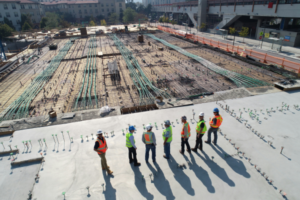Understanding ERP: A Necessity for Small Construction Companies
Enterprise Resource Planning (ERP) systems have become an essential tool for businesses across various industries, including small construction companies. In this section, we will explore the fundamental concepts of ERP and why it is crucial for small construction companies to embrace this technology.
What is ERP?
ERP is a comprehensive software solution that integrates various business functions and processes into a single system. It provides a centralized database and a unified platform, allowing different departments within a company to share information, collaborate, and streamline operations. ERP systems typically cover areas such as project management, accounting, procurement, inventory management, human resources, and more.
Why is ERP Necessary for Small Construction Companies?
- Improved Efficiency and Productivity: Small construction companies often face challenges with manual processes, disjointed systems, and redundant data entry. By implementing an ERP system, these companies can automate routine tasks, eliminate data duplication, and improve overall operational efficiency. This leads to increased productivity and allows employees to focus on more value-added activities.
- Enhanced Project Management: Construction projects involve numerous complex tasks, such as scheduling, resource allocation, cost tracking, and document management. An ERP system provides a comprehensive project management module that allows companies to efficiently plan, execute, and monitor projects. It provides real-time visibility into project progress, resource availability, and budgetary information, enabling better decision-making and proactive management.
- Streamlined Financial Management: Financial management is a critical aspect of any business, including small construction companies. With an ERP system, companies can automate financial processes such as invoicing, budgeting, payroll, and financial reporting. This streamlines financial operations, reduces manual errors, and ensures accurate and timely financial information.
- Effective Resource Allocation: Construction companies deal with various resources, including manpower, equipment, and materials. ERP systems enable better resource planning and allocation by providing visibility into resource availability, utilization, and allocation across projects. This helps in optimizing resource usage, avoiding overbooking, and reducing costs associated with underutilized resources.
- Improved Collaboration and Communication: Construction projects involve multiple stakeholders, including clients, subcontractors, suppliers, and employees. An ERP system facilitates seamless collaboration and communication by providing a centralized platform for sharing project information, documents, and progress updates. This minimizes communication gaps, enhances transparency, and fosters effective collaboration among all parties involved.
- Compliance and Regulatory Requirements: Construction companies need to comply with various regulatory requirements, such as safety standards, environmental regulations, and labor laws. An ERP system helps in ensuring compliance by providing tools to track and manage regulatory requirements, monitor safety protocols, and maintain proper documentation.
In conclusion, ERP systems are a necessity for small construction companies due to their ability to enhance efficiency, streamline operations, improve project management, optimize resource allocation, facilitate collaboration, and ensure compliance. By embracing ERP technology, small construction companies can overcome the challenges of a competitive industry and achieve sustainable growth.
Identifying the Need for ERP in Your Small Construction Company
Before implementing an ERP system, it is crucial for small construction companies to identify the specific need and benefits it can bring to their operations. This section will guide you through the process of recognizing signs that indicate your company may require an ERP solution.
Evaluating Current Business Challenges
- Inefficient Project Planning and Execution: Do you struggle with project delays, resource conflicts, or inadequate project documentation? An ERP system can streamline project planning, scheduling, and execution processes, enabling better project management and timely completion.
- Lack of Real-time Visibility: Are you unable to access real-time information about project progress, resource utilization, or financial performance? An ERP system provides a centralized database and real-time reporting capabilities, allowing you to make informed decisions based on up-to-date data.
- Manual and Time-consuming Processes: Are you spending excessive time on manual data entry, paperwork, or generating reports? An ERP system automates routine tasks, reducing manual effort and improving overall efficiency.
- Data Inaccuracy and Duplication: Do you face challenges with data inconsistency, duplication, or errors? An ERP system ensures data integrity by eliminating duplicate data entry and providing standardized processes for data management.
- Difficulty in Financial Management: Are you struggling with invoicing, budgeting, or financial reporting? An ERP system streamlines financial processes, automates invoicing, tracks expenses, and generates accurate financial reports.
- Poor Inventory Management: Do you face issues such as stock-outs, overstocking, or difficulties in tracking inventory? An ERP system offers inventory management features that enable better control over inventory levels, procurement, and materials planning.
- Ineffective Communication and Collaboration: Do you experience communication gaps or delays between different departments or project stakeholders? An ERP system provides a centralized platform for seamless communication, document sharing, and collaboration.
Assessing Scalability and Growth Potential
- Increasing Complexity and Volume of Projects: Are you taking on larger or more complex projects that require better management and control? An ERP system can support your growth by providing scalability, allowing you to handle increased project sizes and volumes.
- Expanding Geographic Reach: Are you expanding your operations to new locations or targeting projects in different regions? An ERP system facilitates centralized control and coordination across multiple sites or branches, ensuring consistency in processes and data management.
- Adding New Business Functions: Are you diversifying your services or adding new business functions? An ERP system can integrate various functions such as project management, accounting, procurement, and more, enabling seamless collaboration and data flow between departments.
- Compliance and Reporting Requirements: Are you facing challenges in meeting regulatory or reporting requirements? An ERP system provides tools and features to ensure compliance with industry regulations and streamline reporting processes.
By evaluating your current business challenges and assessing your scalability and growth potential, you can determine whether implementing an ERP system is necessary for your small construction company. The next step is to weigh the costs versus benefits of implementing ERP, which we will explore in the next section.
Choosing the Right ERP Solution for Your Small Construction Company
Selecting the right ERP solution is a critical decision for small construction companies. In this section, we will discuss the key factors to consider and the steps involved in choosing an ERP solution that aligns with the specific needs and requirements of your company.
Assessing Your Business Needs
- Identifying Functional Requirements: Determine the specific functionalities and features your construction company needs from an ERP system. Consider areas such as project management, accounting, procurement, inventory management, resource allocation, and reporting.
- Analyzing Integration Requirements: Assess the systems and software currently used in your company and identify the level of integration required with the ERP system. Ensure that the ERP solution can seamlessly integrate with existing software, such as estimating tools, scheduling software, or CRM systems.
- Considering Scalability: Evaluate your company’s growth plans and assess whether the ERP solution can scale accordingly. Ensure that the system can handle increasing project sizes, additional users, and expanding operations.
Evaluating ERP Providers
- Researching ERP Providers: Conduct thorough research on ERP providers that specialize in the construction industry. Look for providers with a proven track record of successful implementations and a strong customer base in the construction sector.
- Reviewing Product Features: Evaluate the features and functionalities offered by each ERP provider. Look for features specific to the construction industry, such as project cost tracking, change order management, equipment tracking, and subcontractor management.
- Checking Industry Experience: Consider the ERP provider’s experience in the construction industry. A provider with industry-specific knowledge will be better equipped to understand your company’s unique needs and challenges.
- Assessing Customization Options: Determine the level of customization offered by each ERP solution. Construction companies often have unique processes and requirements, so the ability to tailor the system to match your specific needs is crucial.
- Evaluating User-Friendliness: Consider the usability and user interface of the ERP system. It should be intuitive and easy to navigate for your employees, minimizing the learning curve and maximizing user adoption.
- Seeking References and Reviews: Request references from the ERP providers and contact their existing customers to gather feedback on their experiences. Additionally, read reviews and testimonials online to gain further insights into the provider’s reputation and customer satisfaction.
On-Premises vs. Cloud-Based ERP
- Assessing Infrastructure and IT Capabilities: Evaluate your company’s IT infrastructure and capabilities to determine whether an on-premises or cloud-based ERP solution is more suitable. On-premises ERP requires hardware setup and maintenance, while cloud-based ERP offers scalability and remote accessibility.
- Considering Cost and Budget: Compare the costs associated with on-premises and cloud-based ERP solutions. On-premises ERP typically involves upfront costs for hardware and software licenses, while cloud-based ERP involves monthly subscription fees.
- Analyzing Security and Data Protection: Evaluate the security measures provided by the ERP solution, whether on-premises or cloud-based. Consider factors such as data encryption, access controls, backups, and disaster recovery plans.
Making the Decision
- Create a Shortlist: Based on the assessments and evaluations, create a shortlist of ERP providers that align with your company’s needs and requirements.
- Request Demos and Conduct Trials: Schedule product demonstrations and request trial access to the ERP systems on your shortlist. This will allow you to experience the system firsthand and evaluate its usability and functionality.
- Involve Key Stakeholders: Involve key stakeholders from different departments in the decision-making process. Gather their feedback and ensure that the chosen ERP solution meets the needs of all departments.
- Consider Long-Term Support and Maintenance: Evaluate the support and maintenance provided by the ERP provider. Ensure that they offer ongoing support, updates, and training to help your company maximize the benefits of the ERP system.
By carefully assessing your business needs, evaluating ERP providers, and considering the deployment options, you can make an informed decision and choose the right ERP solution that will drive efficiency, productivity, and growth in your small construction company.
Implementing the ERP System in Your Small Construction Company
Once you have selected the appropriate ERP solution for your small construction company, it is time to embark on the implementation process. This section will guide you through the steps involved in successfully implementing the ERP system in your organization.
Planning and Preparing for the Implementation
- Establish an Implementation Team: Form a dedicated team comprising key stakeholders, project managers, IT personnel, and end-users. Assign roles and responsibilities to each team member to ensure effective coordination throughout the implementation process.
- Define Project Scope and Objectives: Clearly define the scope of the ERP implementation project, including the modules to be implemented, timelines, and desired outcomes. Set realistic goals and objectives that align with your company’s strategic vision.
- Conduct a Gap Analysis: Assess the gaps between your current business processes and the functionalities offered by the ERP system. Identify areas that require customization or process restructuring to ensure a smooth transition.
- Develop an Implementation Plan: Create a comprehensive plan that outlines the tasks, milestones, and timelines for each phase of the implementation process. Ensure that the plan includes provisions for data migration, testing, training, and post-implementation support.
- Data Cleansing and Migration: Cleanse and validate your existing data before migrating it to the new ERP system. Remove duplicate entries, correct errors, and ensure data integrity to avoid issues during the implementation process.
Training Your Team on the New System
- User Training: Provide comprehensive training programs for end-users to familiarize them with the new ERP system. Focus on training specific to their roles and responsibilities, ensuring they understand how to navigate the system and perform their tasks effectively.
- Train-the-Trainer Approach: Consider adopting a train-the-trainer approach, where a select group of employees receives in-depth training on the ERP system. These employees can then train their respective teams, ensuring knowledge transfer and ongoing support.
- Hands-On Learning: Encourage hands-on learning through system simulations, practice exercises, and real-life scenarios. This approach allows users to gain practical experience and build confidence in using the ERP system.
- Ongoing Support: Provide continuous support to users during and after the implementation process. Establish a helpdesk or support channel where users can seek assistance, report issues, and receive prompt resolutions.
Monitoring and Adjusting the System After Implementation
- Post-Implementation Review: Conduct a thorough review of the ERP system’s performance immediately after implementation. Identify any issues, gaps, or areas for improvement and address them promptly.
- Monitor Key Performance Indicators (KPIs): Define KPIs to measure the system’s effectiveness and monitor them regularly. These KPIs may include project completion time, resource utilization, financial accuracy, and user adoption rates.
- Gather User Feedback: Regularly seek feedback from end-users to understand their experience and identify any pain points or areas of improvement. Use this feedback to make necessary adjustments and enhancements to the system.
Continuous Improvement and Regular Updates
- Embrace Continuous Improvement: Continuously evaluate and refine your business processes to further optimize operations. Leverage the ERP system’s capabilities to identify areas for improvement and implement best practices.
- Stay Up to Date with System Updates: Keep the ERP system updated with the latest software releases and patches provided by the ERP provider. Regularly review new features and enhancements to take advantage of additional functionalities.
- Engage with the ERP Provider: Maintain an ongoing relationship with the ERP provider, participating in user groups, attending training sessions, and seeking their guidance on system optimization and future enhancements.
By following these implementation guidelines, training your team effectively, monitoring system performance, and embracing continuous improvement, your small construction company can successfully implement the ERP system and leverage its capabilities to enhance productivity, streamline operations, and achieve long-term success.




